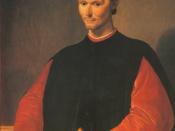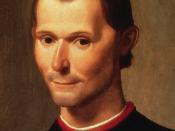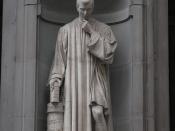One of the most controversial figures in political theory history, Niccolo Machiavelli's ideas and theories have stirred a tide of controversy and debate amongst scholars, critics and political theorists. His most famous book, "The Prince", was revolutionary in that it presented a vision of political rule purged of extraneous moralising influences. Unlike Plato and Aristotle before him, Machiavelli wanted to draw rules for successful political behaviour from history and experience, not from the realm of imagination or from the demands of Christian ethics. "The Prince" in many ways represents a fundamental break in the history of political theory between realism and idealism. For Machiavelli, politics is not about the good life or the achievement of justice but it is a very important autonomous activity with its own rules - not derived from any other types of rules or laws. Machiavelli assumes that the purpose of politics is to ensure the autonomy and sovereignty of the state, that it is a mixture of good and evil and not a pure activity.
Central to Machiavelli's thesis are the notions of virtu and fortuna, which he re-defines to hammer home his arguments. For civic humanists, virtu was understood in its Aristotelian sense, connoting moral goodness. To Machiavelli however, the term virtu is employed to refer to the range of personal qualities that the prince will find it necessary to acquire in order to "maintain his state" and to "achieve great things," the two standard markers of power for him. By contrast, fortuna exists as the enemy of the political order, the ultimate threat to the security and stability of the state. Machiavelli revives in his work the pagan notion of Fortune as an essentially uncontrollable goddess, who may nevertheless grant her favours to a man of virtu. A...


